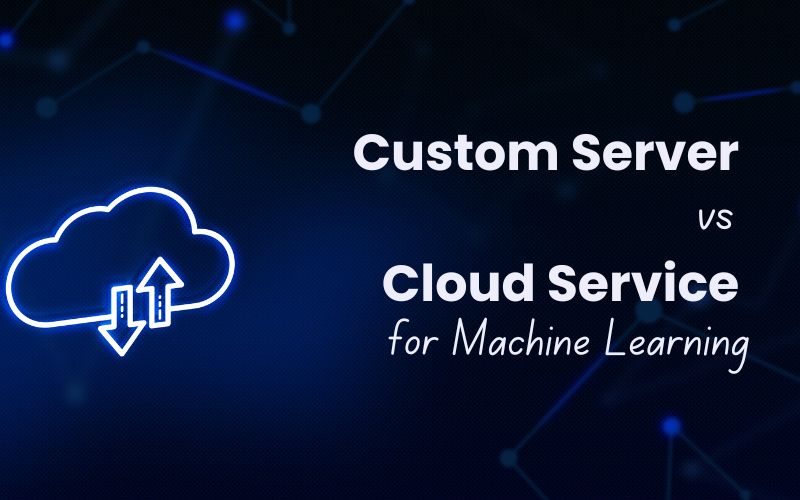Custom Server vs Cloud Service for Machine Learning

In the rapidly evolving field of machine learning, the choice between using custom servers or cloud services can significantly impact the success of your projects. Both options offer unique benefits and challenges, making the decision complex but crucial. This blog post will explore the intricacies of custom servers and cloud services, provide real-world use cases, and offer example configurations for a small AI model with 1 TB of data.
Understanding Custom Servers
A custom server is a physical machine dedicated solely to your machine learning tasks. These servers are often built and managed by your in-house team, tailored to meet specific requirements of your projects.
Advantages of Custom Servers
- Control and Customization: Custom servers offer complete control over the hardware and software configurations. You can optimize your server to match the exact needs of your machine learning model, leading to potentially higher performance.
- Security: With a custom server, you have full control over security measures, reducing the risk of data breaches. This is particularly important for sensitive data and industries with strict compliance requirements.
- Cost Management: Over time, the cost of owning and maintaining a custom server can be lower compared to recurring cloud service fees, especially for long-term projects.
Disadvantages of Custom Servers
- High Initial Cost: Setting up a custom server requires a significant upfront investment in hardware and infrastructure.
- Maintenance: Ongoing maintenance, including hardware upgrades, software updates, and troubleshooting, requires a skilled IT team, adding to operational costs.
- Scalability: Scaling a custom server to meet increasing demands can be challenging and costly, often requiring additional physical hardware.
Real-World Use Cases for Custom Servers
- Healthcare: Custom servers are ideal for healthcare applications where data security and privacy are paramount. Hospitals and research institutions often use custom servers to store and process sensitive patient data.
- Finance: Financial institutions, dealing with highly sensitive information and regulatory requirements, benefit from the enhanced security and control offered by custom servers.
- Large Enterprises: Companies with the necessary resources and expertise often prefer custom servers for their critical machine learning projects due to the level of control and customization available.
- Government Agencies: Government agencies often handle highly sensitive data, including personal information of citizens. Custom servers provide the necessary security and compliance with data protection regulations.
- Academic Research: Universities and research institutions conducting intensive computational research, such as genomics, climate modeling, and physics simulations, benefit from the high-performance computing capabilities of custom servers.
- Media and Entertainment: Companies involved in media production, such as film studios and animation companies, require powerful servers to render graphics and process large volumes of video data.
- Autonomous Vehicles: Development of autonomous driving systems involves processing massive amounts of sensor data. Custom servers offer the performance and reliability needed for real-time data processing and machine learning model training.
Exploring Cloud Services
Cloud services offer machine learning capabilities through virtualized resources, provided by companies like Amazon Web Services (AWS), Google Cloud Platform (GCP), and Microsoft Azure. These services allow users to access powerful computing resources over the internet.
Advantages of Cloud Services
- Scalability: Cloud services provide virtually unlimited scalability. You can easily scale up or down based on your project’s requirements without significant investment in physical hardware.
- Cost Efficiency: Cloud services operate on a pay-as-you-go model, allowing you to manage costs effectively. This is especially beneficial for startups and small businesses.
- Accessibility: Cloud services are accessible from anywhere with an internet connection, facilitating collaboration among remote teams.
- Maintenance-Free: The cloud service provider handles all maintenance tasks, including updates and hardware management, freeing up your team to focus on development.
Disadvantages of Cloud Services
- Ongoing Costs: While the initial cost is lower, the ongoing subscription fees can add up over time, especially for long-term projects.
- Data Security: Although cloud providers invest heavily in security, the risk of data breaches still exists. You must rely on the provider’s security measures.
- Limited Customization: Cloud services offer less control over the underlying hardware and software configurations compared to custom servers.
Real-World Use Cases for Cloud Services
- Startups: Startups benefit from the low initial costs and scalability of cloud services, allowing them to grow their infrastructure as their needs evolve.
- Education: Educational institutions use cloud services to provide students and researchers with access to powerful computing resources without significant investment.
- SMBs: Small and medium-sized businesses leverage cloud services for their flexibility, cost efficiency, and ease of use.
- E-commerce: Online retailers use cloud services to personalize shopping experiences, recommend products, and optimize inventory management using machine learning algorithms. The scalability of cloud services is crucial during peak shopping seasons.
- Healthcare Startups: Startups in the healthcare sector leverage cloud services to develop and deploy applications such as telemedicine platforms, predictive analytics for patient care, and AI-driven diagnostic tools.
- Marketing and Advertising: Digital marketing agencies use cloud-based machine learning to analyze consumer behavior, optimize ad placements, and enhance targeting strategies.
- Gaming Industry: Game developers use cloud services to analyze player behavior, optimize game performance, and provide real-time analytics to enhance the gaming experience.
Example Configuration for a Small AI Model with 1 TB of Data
Custom Server Configuration
For a small AI model with 1 TB of data, a custom server configuration might include:
- CPU: Intel Xeon E5-2690 v4 (14 cores, 28 threads)
- Rationale: Provides high computational power for training complex models.
- GPU: NVIDIA Tesla V100 (32 GB)
- Rationale: Accelerates deep learning tasks, significantly reducing training times.
- RAM: 256 GB DDR4
- Rationale: Ensures sufficient memory for large datasets and model parameters.
- Storage: 4 x 1 TB NVMe SSDs in RAID 0
- Rationale: High-speed storage for fast data access and model training.
- Network: 10 Gbps Ethernet
- Rationale: Enables high-speed data transfer within the network.
- Operating System: Ubuntu 20.04 LTS
- Rationale: Provides a stable and widely supported environment for machine learning frameworks like TensorFlow and PyTorch.
Custom Server Cost Estimate
- Initial Hardware Cost:
- CPU: $2,000
- GPU: $8,000
- RAM: $1,500
- Storage: $1,200
- Network: $500
- Total: ~$13,200
- Maintenance Costs:
- Annual maintenance (IT staff, power, cooling, etc.): ~$5,000
Cloud Service Configuration
Using AWS as an example, a suitable configuration might include:
- Instance Type: p3.2xlarge (8 vCPUs, 61 GB RAM)
- Rationale: Provides a balanced mix of CPU, GPU, and memory resources for training machine learning models.
- GPU: 1 x NVIDIA Tesla V100
- Rationale: High-performance GPU for accelerated deep learning.
- Storage: 1 TB Amazon EBS General Purpose SSD (gp3)
- Rationale: High-performance storage for large datasets.
- Network: Up to 10 Gbps
- Rationale: Fast network speeds for data transfer and communication with other cloud resources.
- Operating System: Ubuntu 20.04 LTS
- Rationale: A widely supported OS for machine learning applications.
Cloud Service Cost Estimate (AWS p3.2xlarge)
- Hourly Cost: $3.825 per hour (as of 2024)
- Monthly Cost: $3.825 * 24 hours * 30 days = $2,754
- Annual Cost: $2,754 * 12 months = $33,048
Performance Considerations
- Custom Servers: Offer high performance tailored to specific needs, with direct access to hardware and potential for optimization. Suitable for projects where latency and data privacy are critical.
- Cloud Services: Provide flexibility, scalability, and ease of use. Ideal for projects with variable workloads, rapid development cycles, and collaboration among distributed teams.
Conclusion
The choice between custom servers and cloud services for machine learning depends on various factors, including your budget, security requirements, scalability needs, and the nature of your project. Custom servers offer unparalleled control and security, making them ideal for industries with stringent requirements. In contrast, cloud services provide flexibility, scalability, and cost efficiency, making them perfect for startups and growing businesses.
By understanding the advantages and disadvantages of each option and considering real-world use cases, you can make an informed decision that aligns with your machine learning objectives. Whether you opt for the control of a custom server or the flexibility of a cloud service, both paths offer the potential to drive significant advancements in your machine learning projects, leading to innovative solutions and enhanced capabilities.
